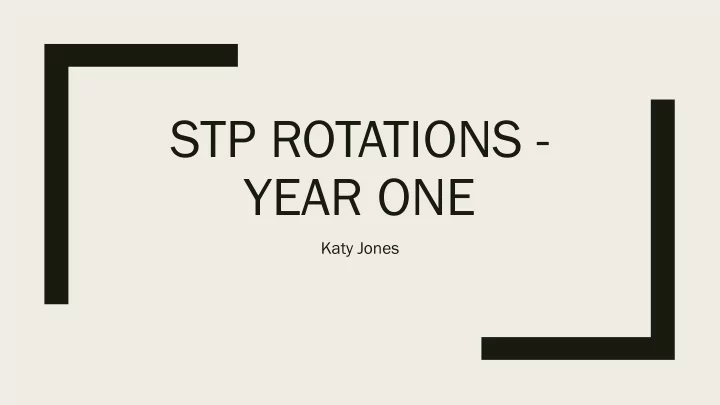

STP ROTATIONS - YEAR ONE Katy Jones
The Problem We Are Facing… ■ Genomics is a compulsory specialty for a high number of Life Sciences STP Training Programs ■ Reconfiguration is moving us towards fewer centres and deduplication may mean that certain labs don’t actually offer everything that needs to be covered as part of the rotation ■ High workloads and low staff numbers reduce the capacity for training individuals from outside our specialty ■ Signing off lengthy competencies adds to the training burden
A New Approach to Rotations ■ Currently trainees join the laboratory for 10-12 weeks to cover the core aspects of Genomics – Once their rotation has finished, trainees leave and don’t come back! ■ Movement towards a ‘workshop style’ approach to rotations could cut down on hours spent training and hours spent marking work ■ Resources are being compiled to provide: – Training logbooks for trainees – Presentations for labs to deliver – Case scenarios for trainees to work through to cover their competencies
Modular Approach ■ Introduction to Genomics – Includes Quality and Health and Safety – The role of Genomics in Healthcare – Reconfiguration…??? ■ Karyotyping – Principals, referral patterns, theory and case scenarios ■ Microarrays – Principals, referral patterns, theory and case scenarios ■ Molecular Genetics – Brief overview, referral patterns and case scenarios for some core diseases
What will the resources be? ■ Trainee Logbook – This will contain everything the trainee will cover in a single workbook – Brief notes for the trainees to expand upon and keep as reference material – Case scenarios to complete during the workshops ■ Presentations – More detailed information than is covered in the logbook – Follows the same style and layout as logbooks to make it easy for centres to deliver and trainees to follow
What will the workshops look like? ■ A full week of lectures and sessions to work through case scenarios ■ Each ‘module’ can be covered over a day by different staff members, keeping the ‘hands on’ training time to a minimum for individuals ■ Results for case scenarios can be provided at the end of each session – saves time marking lengthy competencies ■ Trainees can work together to support each other
Signing off Competencies ■ Trainees can be required to sign in each day and will be issued a certificate of attendance – Trainees can upload their certificate to OneFile as evidence of all competencies – Completed Case Scenarios can be checked over to ensure that they were successfully completed ■ Case Based Discussion – Group style approach overseen by lab staff – Group presentations could be delivered at the end of the week ■ DOPs – Trainees could upload a single report and assign to a named person to sign off on OneFile – These could then be spread around lab staff meaning no great workload on any one individual
Other things to consider ■ Laboratory Tour – Break up into smaller groups to show trainees the laboratory ■ Introduction to MDT approach – Overview of MDT employed in dept – eg Prenatal Arrays or 100,000 Genomes Project cases ■ Introduction to Clinics – Could include a session from Clinician/Counsellor
Where are we up to and what do we need? ■ Compiling resources – Writing logbooks and presentations – We don’t want to reinvent the wheel – if any resources are out there already that you would be willing to share – please do! ■ Approval from the National School – They have accepted the principal and understand the need for change ■ Any suggestions or ideas! – If you can see any problems/issues we haven’t yet, please share
Don’t forget!!! ■ These resources aren’t just for STPs – they could provide excellent introductions for any new/rotating staff within the department
Recommend
More recommend